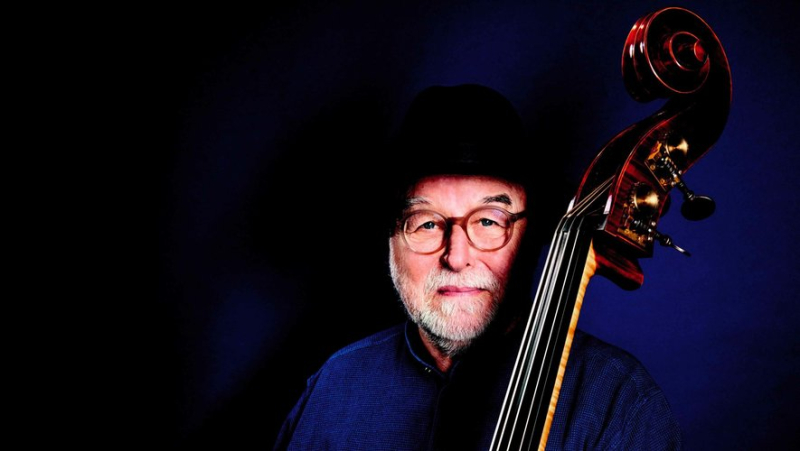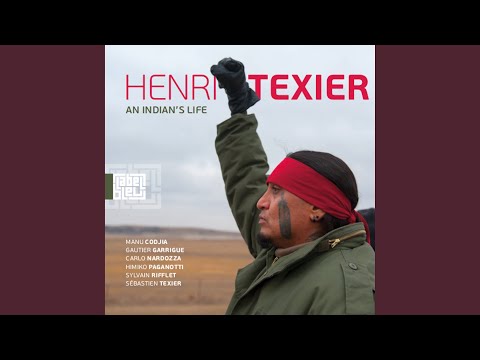“It’s a truly collective creation!” : the immense double bassist Henri Texier at the Radio France Festival

Souvent surnommé le “Mingus français”, l'immense contrebassiste Henri Texier fait montre, à 79 ans, d'une fraîcheur et d'une créativité renversantes. Sylvain Gripoix
Double bassist Henri Texier, 79, presents his fantastic septet project “An Indian’s life” this Wednesday as part of the Radio France Festival. Meeting with an authentic sachem of French jazz with unstoppable enthusiasm:
After “An Indian’s week” (1993) and “Sky dancers” (2016), “An Indian’s life” is the third album that you dedicate to Native Americans. Where does this fascination come from??
Houlala, that goes back a long, long way! I am from that post-war generation, who, under the influence of American films, loved playing cowboys and Indians. I immediately preferred being an Indian. I do not know why. Maybe because it only took a little to disguise yourself: a feather, a piece of wood, a string, my mother's lipstick for war paint… hellip; That was childish. But very quickly, as a teenager, I understood that these were real people, not shadows in westerns, and that they were not the bad guys, but the opposite, that they had asked for nothing and that the whites had stolen their land… So I started researching them, it became a passion, and I was extremely touched by their respect for nature. And then, it is a people who have been martyred and who continue to be. So, I find that it is worth it in an ethical and musical approach to do what we are doing right now: talking about it. We talk but they are still the subject of completely stupid and ridiculous clichés. Besides, I very quickly hated the westerns of John Ford and the other big bastard, John Wayne, brrr… (laughs)
Can we say that the Indians were at the origin of your political articulation ?
They clearly contributed to it. But first there is the environment from which I come: proletarian, from the bottom of the ladder. I was raised to respect human beings, regardless of color, origin, and everything. I also grew up in the memory of my uncle who was in the Resistance, in the communist youth, and who was shot in 1942 at Mont Valérien. And with that, I discovered Indians, and a short time later, as a teenager, jazz, and therefore black Americans, also oppressed.
We were actually going to make this connection…
I'm not going to go into details but in addition to the question of oppression, it is a historical fact that there were connections between slaves in fleeing or freedmen, and Native Americans. Finally, in short, this interest in American Indians is more than a passion, it is part of who I am. Sometimes I take breaks because their story is deep down with terrible sadness. But every now and then it comes back to me. There, I talked about a triptych but who knows if it won't be a tetralogy, or even more! (laughs)
In your music, there is no folkloric element.
It’is more of a poetic inspiration than a musical… because there is no real music among Native Americans. There are very few instruments in their home: the drum, the voice, sometimes the whistle. And nothing that relates to an artistic approach in their tradition. Music, for them, belongs to the ritual, it participates in it, whether it has to do with communication with the spirits, with healing, or with any other ceremonial reason. In all cases, the musical accompaniment is purely utilitarian, and has absolutely nothing to do with the tom-tom that we hear in films, in four beats, which emphasizes the first beat . That’s Hollywood nonsense, that! (laughs) Among the Indians, the beat is regular, one strong, one weak, to imitate the heart. But for the most part, they are songs.
So if we have to look for something Indian in your music, we will find it in its spirit, its freedom, in the wide open spaces that ;she opens!
That’s exactly it! I slipped in a drum beat once or twice, but that’s it. And then, I'm not an "Indian lover" as the Native Americans themselves call these people who think they are Indians (they can't stand them, those). I don't think of myself as an Indian, and I'm not fooled by the Amerindian world: I know that they can also be unjust, cruel or stupid, in short, they are human. Except that they also have, whatever their tribe, this absolute respect for nature.

Tell us about the tribe you brought together for this project!
There is my son Sébastien on alto sax, with whom I have been playing for thirty, thirty-five years. Since I invited him to my training we have never stopped playing together, it’s a real companionship. There is also Gautier Garrigue, a great drummer (from Perpignan by the way) who has been with me for five, six years. With guitarist Manu Codjia, it must have been twelve years, easy, that we have been touring together. I am faithful: when I feel that with the musicians I am with, there are still paths, territories, to clear and decipher, I change nothing! There is also Carlo Nardozza who, as his name suggests, is a Flemish trumpeter: I discovered him about fifteen years ago, he plays terrible, I wanted him for this project. There is also Sylvain Rifflet, on tenor sax. I had heard of him but it was while watching his tribute to Stan Getz at the Europa Jazz festival on YouTube that I fell in love with his sound!
And you also invited a singer?
Yes, Himiko Paganotti whom I discovered in Nguyen Lê's quartet, on his magnificent project Songs of Freedom. So I asked Nguyen Lê if he didn’t mind if I invited Himiko. On the album she sings on the Black and Blue standard but in concert she also says texts, one by Sitting Bull and others by Prévert, which I selected. She is an excellent musician, she hears everything so well when she says a text, while we play, she enters into the form of the harmonic canvas of improv; as if she were improvising the words, it’s very nice.
We noticed that the drummers and bassists in their leading project were always very generous with their musicians…
Ah yes, generous, it’s the least I can do. But yes, that’s true in general. I have listened to several albums by drummers recently and told myself that they underestimated themselves too much, that they underdistributed themselves, that they should let more space for their instrument. But to come back to your remark, bassists and drummers, when they are conductors of an orchestra, as soon as the piece has started, they have both hands full, they can no longer direct…hellip; unless you shout! This means that you must make yourself understood clearly beforehand by your accomplices. We must therefore be in deep complicity, real understanding, with understanding and discernment. And as always in jazz, you have to be precise so that your friends know where to go at the same time relaxed so that they have as much freedom as possible.
But at home, no one smears the music with their virtuosity !
If it ever happened that a guy smeared or pulled the blanket on him, he wouldn't stay very long! (laughs) For concerts, I make organization charts so that each soloist has the opportunity to express themselves fairly. I really care about that: that there is room for everyone. For me, a group should be like a sphere in which everyone is equidistant from the center, but can move freely and in all directions.
In fact, your music exudes a fullness (to use your image of the sphere, it is full and it’s nice) but also a vitality, a positive energy that is frankly delightful!
Thank you, and so much the better, really! Frankly, I love all my records, I'm not one of those guys who say this one, I don't like it, this one, I can't listen to it anymore. I don't regret a single note from any of my albums, even if they happen to not be terrible, I don't regret them because they were all played in the best possible conditions. But "An Indian’s life", honestly, something special happened, everyone was so involved. It’s a truly, deeply, collective creation. I don't consider myself a composer. Like a melodist, okay, but not a composer. I suggest melodies and we work on them together. I only work with musicians that I admire and my job as a conductor is not to exploit them but to highlight them. It’s a story, yes, of love. It may be a bad word but we need it right now, I think.
In concert this Wednesday July 10 at 8:30 p.m. at the Agora theater in Montpellier. Concert recorded by France Musique for broadcast on July 13 at 8 p.m. I subscribe to read more




